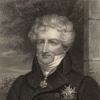Georges Cuvier

Georges Cuvier
Jean Léopold Nicolas Frédéric Cuvier, known as Georges Cuvier, was a French naturalist and zoologist, sometimes referred to as the "father of paleontology". Cuvier was a major figure in natural sciences research in the early 19th century and was instrumental in establishing the fields of comparative anatomy and paleontology through his work in comparing living animals with fossils...
NationalityFrench
ProfessionScientist
Date of Birth23 August 1769
CountryFrance
men race space
Genius and science have burst the limits of space, and few observations, explained by just reasoning, have unveiled the mechanism of the universe. Would it not also be glorious for man to burst the limits of time, and, by a few observations, to ascertain the history of this world, and the series of events which preceded the birth of the human race?
say-anything information problem
It is evident that one cannot say anything demonstrable about the problem before having resolved these preliminary questions, and yet we hardly possess the necessary information to solve some of them
hard-work men names
The works which this man [Joseph Banks] leaves behind him occupy a few pages only; their importance is not greatly superior to their extent; and yet his name will shine out with lustre in the history of the sciences.
water long mountain
Thus it cannot be denied that the masses which today form our highest mountains were originally in a liquid state; for a long time they were covered by waters which did not sustain any life.
science fossils earth
Why has not anyone seen that fossils alone gave birth to a theory about the formation of the earth, that without them, no one would have ever dreamed that there were successive epochs in the formation of the globe.
country animal development
Hence the same instant which killed the animals froze the country where they lived. This event was sudden, instantaneous, without any gradual development.
land dry body
The appearance of the bones of quadrupeds, especially those of complete bodies in the strata, tells us either that the layer itself which carries them was in earlier times dry land or that dry land was at least formed in the immediate area.
marine animal earth
Secondly, the nature of the revolutions which have altered the surface of the earth must have had a more decisive effect on the terrestrial quadrupeds than on the marine animals.
law harmony aids
It is in this mutual dependence of the functions and the aid which they reciprocally lend one another that are founded the laws which determine the relations of their organs and which possess a necessity equal to that of metaphysical or mathematical laws, since it is evident that the seemly harmony between organs which interact is a necessary condition of existence of the creature to which they belong and that if one of these functions were modified in a manner incompatible with the modifications of the others the creature could no longer continue to exist.
men shoes doubt
A famous anecdote concerning Cuvier involves the tale of his visitation from the devil—only it was not the devil but one of his students dressed up with horns on his head and shoes shaped like cloven hooves. This frightening apparition burst into Cuvier's bedroom when he was fast asleep and claimed: 'Wake up thou man of catastrophes. I am the Devil. I have come to devour you!' Cuvier studied the apparition carefully and critically said, 'I doubt whether you can. You have horns and hooves. You eat only plants.
law doe different
Since nothing can exist that does not fulfil the conditions which render its existence possible, the different parts each being must be co-ordinated in such a way as to render possible the existence of the being as a whole, not only in itself, but also in its relations with other beings, and the analysis of these conditions often leads to general laws which are as certain as those which are derived from calculation or from experiment.
understanding littles fossils
It is my object, in the following work, to travel over ground which has as yet been little explored and to make my reader acquainted with a species of Remains, which, though absolutely necessary for understanding the history of the globe, have been hitherto almost uniformly neglected.
animal together form
All organs of an animal form a single system, the parts of which hang together, and act and re-act upon one another; and no modifications can appear in one part without bringing about corresponding modifications in all the rest.
force observation observers
The observer listens to nature: the experimenter questions and forces her to reveal herself.